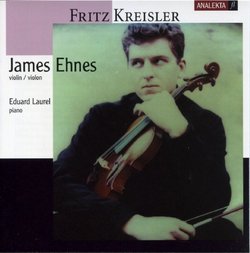| All Artists: Fritz Kreisler, Eduard Laurel, James Ehnes Title: Fritz Kreisler: Variations On A Theme By Corelli; Praeludium & Allegro; Sicilienne & Rigaudon Members Wishing: 2 Total Copies: 0 Label: Analekta Original Release Date: 1/1/2003 Re-Release Date: 4/6/2007 Genres: Dance & Electronic, Special Interest, Classical Styles: Marches, Chamber Music, Historical Periods, Classical (c.1770-1830), Instruments, Strings Number of Discs: 1 SwapaCD Credits: 1 UPC: 774204315924 |
Search - Fritz Kreisler, Eduard Laurel, James Ehnes :: Fritz Kreisler: Variations On A Theme By Corelli; Praeludium & Allegro; Sicilienne & Rigaudon
CD Details |
CD ReviewsKreisler and Ehnes -Ten stars for musical joy - and more Frank T. Manheim | Fairfax VA | 10/05/2005 (5 out of 5 stars) "This recording may be my favorite musical recording discovery in the last ten years. The Analekta recording of Canadian virtuoso violinist, James Ehnes, playing 20 Fritz Kreisler compositions for violin and piano, is relatively expensive. But it's so good that I plan to send copies for Christmas to as many of my family members scattered through the U.S. and Europe as I can afford - whether they're classical buffs or not!
For those who don't know Fritz Kreisler (and they have a treat waiting) he was probably the most beloved classical performer (violin) in his time. He was a multitalented man whose warm humanity, and generous and open spirit made audiences take him to their hearts. Kreisler's unique 60-year musical career only begins with performance. Born in 1875, Kreisler possessed a gift for infectious melody. By the 1920's his audience-pleasing compositions - especially encores - began to encounter avante-gardist prejudices on the part of the professional musical establishment. The establishment accepted musical traditions of the past in older compositions but not in new composition. So the resourceful Kreisler introduced a series of encore masterpieces as "rediscoveries of works by forgotten baroque and rococo composers, whose manuscripts he had been found in a French monastery". Thus came celebrated pieces like Praeludium and Allegro by "Gaetano Pugnani", and "Sicilenne and Rigaudon by "Francois Franceour". After NY Times music critic, Olin Downs, reported research showing that manuscripts of Kreisler's "oldies" didn't exist, Kreisler revealed his hoax in 1935. That brought out angry recriminations by Alfred Newman and other musicologists who had been taken in. Kreisler's technique had a larger influence on the evolution of violin performance, but he will surely be remembered most for unaffectedly capturing - amidst a relentless 20th Century movement to bury melody, romanticism, tonality, and other traditions of music - feelings like the charm of Vienna (Caprice viennois), and the aches and joy of love (Liebesleid and Liebesfreud). James Ehnes'many awards, recordings, and performances with leading conductors and orchestras throughout Asia, the U.S., and Europe, place him among leading concert violinists. It speaks to changed trends among younger musicians that Ehnes (born 1976), would devote this album exclusively to Kreisler's large and small masterpieces with obvious love and understanding. Ehnes shares with Kreisler an "effortless" style and warmth. Besides the music, the liner notes are informative and perceptive, and the recording excellent. A note about ratings: I said "ten stars" in my title, because over the past years the tendency for domination of five-star ratings makes it harder to distinguish truly exceptional recordings. I assume that the predominance of high ratings came about in an understandable way - people are most likely energized to rate recordings they really like. However, the result is loss of breadth, which is unfortunate to my mind. If ratings ranged more widely they could better delineate strengths and weaknesses, as well as stylistic preference. A "three" rating might include a unique quality in an otherwise mediocre release. " |


 Track Listings (5) - Disc #1
Track Listings (5) - Disc #1